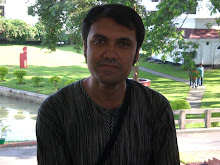
http://news.yahoo.com/s/ap/20090228/ap_on_re_as/as_bangladesh_mutiny_70
More bodies found at Bangladesh mutiny site
By JULHAS ALAM,
Associated Press Writer
Sat Feb 28, 9:35 am ET
DHAKA, Bangladesh – Firefighters dug up 10 more bodies from mass graves at the headquarters of Bangladesh's border guards Saturday, raising the death toll to 76 in the force's two-day mutiny over low pay and other grievances, officials said.
Political allies, who met with Prime Minister Sheikh Hasina at her home Saturday to discuss the uprising, called for national unity in a statement issued after the meeting.
Hasina, who took office in January, persuaded the guards to surrender Thursday with promises of an amnesty coupled with threats of military force.
But she said Friday there would be no amnesty for the killers, and her government gave border guards across the country 24 hours on Saturday to return to their posts or report to a local police station.
The mutineers had hurriedly dumped the bodies of dozens of senior officers into shallow graves and sewers at the headquarters compound in the capital, Dhaka. Among the dead was Maj. Gen. Shakil Ahmed, the commander of the Bangladesh Rifles border force. Dozens more officers were missing, and workers scoured the compound and nearby areas, including a pond, in an intense search for more victims.
"We think there are more bodies," said firefighter Sheikh Mohammad Shahjalal, adding that 10 bodies were dug up Saturday in two mass graves. They found at least one woman's body, which they believed was the commander's wife, he said.
The military postponed funerals for 33 officials until all bodies were found.
"To bury all the deceased with state honors, funeral prayers and burials scheduled for today have been postponed," the military said in a statement, adding that a new date would be announced later.
The bloodshed has raised new questions about stability in the poor South Asian nation and underlined the fragile relationship between Bangladesh's civilian leaders and the military, which has stepped in previously to quell what it considered dangerous political instability.
The country only returned to democracy after elections in late December 2008, nearly two years after an army-backed interim administration took over amid street protests demanding electoral reforms.
Hasina has a bitter history with the military. Her father was Sheikh Mujibur Rahman, the country's independence leader and its first head of state, who was killed in a 1975 military coup along with his wife and three sons.
"It's a setback for Sheikh Hasina's new government. It's now a test for her how she handles the military," said Ataur Rahman, who teaches political science at Dhaka University.
"This tragic event will force her to divert her attention from consolidating democracy and boosting the economy to tackling the challenges of national security," he said.
The army chief, Gen. Moeen U. Ahmed, met Hasina late Friday and pledged his support.
"The military will stand by the government," Ahmed told reporters.
Following the border guards' surrender Thursday, search teams moved into the sprawling Bangladesh Rifles compound that houses the guards and many of their families and found the gruesome evidence of the killings.
One corner of the compound, nestled under the shade of coconut palms, held two mass graves where slain officers had been put into shallow holes and covered with dirt. Firefighters used crowbars to pry off manhole covers and recover more corpses from sewers.
The insurrection erupted from the guards' longtime frustrations that their pay hasn't kept pace with soldiers in the army — anger aggravated by the rise in food prices that has accompanied the global economic crisis. The guards earn about $100 a month. They also demanded better living conditions and allowances for their families.
The guards also didn't like the practice of appointing army officers to head the Bangladesh Rifles and were bitter over being excluded from U.N. peacekeeping missions, which bring additional pay.
___
Associated Press writers Farid Hossain and Parveen Ahmed contributed to this report.

